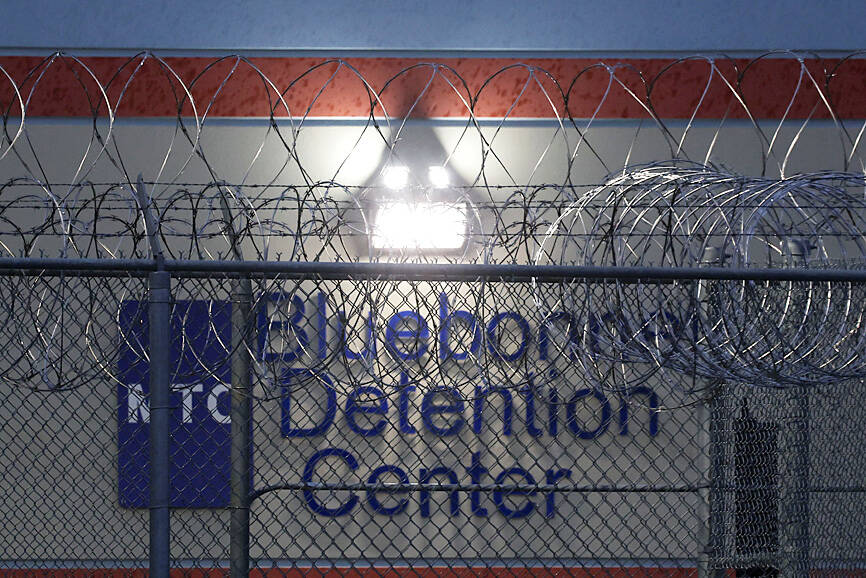The US Supreme Court, in a dramatic nighttime intervention on Saturday, blocked US President Donald Trump’s unprecedented use of an obscure law to deport Venezuelan migrants without due process.
The emergency ruling said that two of the most conservative justices on the nine-member panel had dissented.
The order temporarily prevents the government from continuing to expel migrants under the 1798 Alien Enemies Act — last used to round up Japanese American citizens during World War II.

Photo: Reuters
Trump invoked the law last month to deport Venezuelans to a notorious prison in El Salvador that holds thousands of that country’s gangsters.
The court decision was triggered by imminent plans late on Friday to expel dozens more Venezuelans under the act, meaning they would have been deported with next to no ability to hear evidence or challenge their cases.
The court said that “the government is directed not to remove any member of the putative class of detainees from the United States until further order.”
Trump justifies summary expulsions — and the detention of people in El Salvador — by insisting that he is cracking down on violent Venezuelan criminal gangs now classified by the US government as terrorists.
However, the policy is fueling opposition concerns that the Republican is ignoring the US Constitution in a broader bid to amass power. The row over the Alien Enemies Act comes amid muscular assaults by the Trump administration against big law firms, Harvard and other universities, and major independent media outlets.
The American Civil Liberties Union, which took the lead in seeking to halt Friday’s planned deportations, welcomed the Supreme Court ruling.
“These men were in imminent danger of spending their lives in a horrific foreign prison without ever having had a chance to go to court,” attorney Lee Gelernt said.
On Saturday the government filed a motion with the Supreme Court arguing that it should not be prevented from using the Alien Enemies Act to deport people it says are terrorists.

‘FORM OF PROTEST’: The German Institute Taipei said it was ‘shocked’ to see Nazi symbolism used in connection with political aims as it condemned the incident Sung Chien-liang (宋建樑), who led efforts to recall Democratic Progressive Party (DPP) Legislator Lee Kun-cheng (李坤城), was released on bail of NT$80,000 yesterday amid an outcry over a Nazi armband he wore to questioning the night before. Sung arrived at the New Taipei City District Prosecutors’ Office for questioning in a recall petition forgery case on Tuesday night wearing a red armband bearing a swastika, carrying a copy of Adolf Hitler’s Mein Kampf and giving a Nazi salute. Sung left the building at 1:15am without the armband and apparently covering the book with a coat. This is a serious international scandal and Chinese

PERSONAL DATA: The implicated KMT members allegedly compiled their petitions by copying names from party lists without the consent of the people concerned Judicial authorities searched six locations yesterday and questioned six people, including one elderly Chinese Nationalist Party (KMT) member and five KMT Youth League associates, about alleged signature forgery and fraud relating to their recall efforts against two Democratic Progressive Party (DPP) legislators. After launching a probe into alleged signature forgery and related fraud in the KMT’s recall effort, prosecutors received a number of complaints, including about one petition that had 1,748 signatures of voters whose family members said they had already passed away, and also voters who said they did not approve the use of their name, Taipei Deputy Chief Prosecutor

UNDER ATTACK: Raymond Greene said there were 412 billion malicious threats in the Asia-Pacific region in the first half of 2023, with 55 percent targeting Taiwan Taiwan not only faces military intimidation from China, but is also on the front line of global cybersecurity threats, and it is taking action to counter those attacks, President William Lai (賴清德) said yesterday. Speaking at the opening of this year’s Cybersec Expo in Taipei, the president assured foreign diplomats and exhibitors that Taiwan remained committed to strengthening its defense against cyberattacks and enhancing the resilience of its digital infrastructure. Lai referenced a report from the National Security Bureau (NSB) indicating that the Government Service Network faced an average of 2.4 million intrusion attempts daily last year, more than double the figure

Retired US general Robert B. Abrams reportedly served as adviser to Chief of the General Staff Admiral Mei Chia-shu (梅家樹) during the Ministry of National Defense’s computer-simulated war games in the buildup to this year’s 41st annual Han Kuang military exercises, local media reported yesterday. For 14 days and 13 nights starting on April 5 and ending yesterday, the armed forces conducted the computer-simulated war games component of the Han Kuang exercises, utilizing the joint theater-level simulation system (JTLS). Using the JTLS, the exercise simulated a continuous 24-hour confrontation based on scenarios such as “gray zone” incursions and the Chinese People’s Liberation